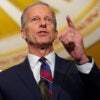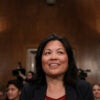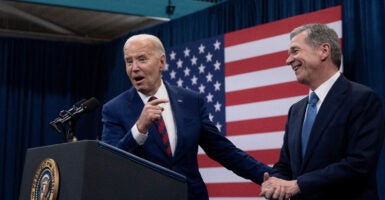FIRST ON THE DAILY SIGNAL—North Carolina election officials were perplexed about how to follow President Joe Biden’s directive to expand voting among convicted felons, according to emails obtained by The Daily Signal.
Biden’s Executive Order 14019, which put the power of federal agencies behind mobilizing voters, calls for the Justice Department to ensure that convicted felons know how to restore their voting rights. Those rules vary by state.
State election officials were set to have a Zoom conference June 25, 2021, with White House officials on implementing the president’s order, including questions and suggestions.
A day before the conference, Karen Bell, executive director of the North Carolina State Board of Elections, emailed staff about what points they wanted to address.
“The main one I can think of ideas for is about felons and voting,” Katelyn Love, general counsel for the Board of Elections replied via email, before citing the U.S. Department of Justice. “We don’t get notice from DOJ when a felon completes their sentence. This would be helpful information for us to have, so we know that the person is eligible to register again.”
Love continued: “If they don’t already, DOJ could provide information to NC felons when they start probation or when they are placed on supervised release (it’s not called parole anymore) that they are not eligible to register and vote until they complete their sentence.”
Kelly Tornow, associate counsel for North Carolina’s election board, responded: “Those are great felon ideas.”
Tornow said she was primarily concerned with enlisted U.S. service members and the Defense Department, and wrote that “the military should provide information to the service member about registering to vote.”
The Daily Signal obtained 159 pages of documents from the North Carolina State Board of Elections regarding Biden’s order on voter mobilization through a public records request.
Critics use the term “Bidenbucks” to refer to the president’s controversial executive order, which they say is meant to use the force of government to tip the scales in elections.
Federal agencies have coordinated with transparently left-leaning advocacy groups to implement Biden’s order.
Further, several Republicans in Congress contend that Biden’s order on turning out the vote could violate the Antideficiency Act, a law that prohibits federal employees from obligating tax dollars not authorized by Congress.
The lawmakers also express concern about federal agencies’ engaging in partisan political activity in violation of laws such as the Hatch Act, which prohibits federal employees from using work time or resources for partisan political activities.
Last year, on March 13, Sarah Bolton, former policy director for North Carolina Gov. Roy Cooper, a Democrat, forwarded an email to Bell, the executive director of the state election board, who at the time was secretary-treasurer of the National Association of State Election Directors.
The email forwarded by Bolton was about paying college students to register voters. Students are viewed as a key constituency for Democrats.
Bolton told Bell to “let me know if this might be of interest. If it is, I can connect you directly.”
She forwarded a message from Michael Dannenberg, senior fellow for the College Promise and a consultant with the Foundation for Civic Leadership, in which he wrote:
We’re hoping Karen in her new role with the National Association of State Election Directors (NASED) might consider joining, maybe even leading, a non-partisan effort to get state and local officials to urge [U.S. Education Secretary Miguel] Cardona to make clear that government entities, notably offices that NASED members lead, and non party-affiliated, non-profit 501(c)(3) organizations like the League of Women Voters can pay work study students with Federal Work Study funds for non-partisan voter registration work just as colleges now can for identical work.
Mitchell D. Brown, equal justice work fellow for the Southern Coalition for Social Justice, sent an email Aug. 17, 2021, to Damon Circosta, then chairman of the North Carolina State Board of Elections, about the need to “target federal agencies and programs that we think would be good opportunities for voter registration.”
Copied on the email was Laura Williamson, then associate director of democracy at Demos, a liberal think tank that drafted Biden’s executive order. Demos also is working with several federal agencies to implement the order.
Brown’s email included an attachment with recommendations for using federal agencies to get out the vote. They included using U.S. Citizenship and Immigration Services through its naturalization ceremonies; signing up voters on Healthcare.gov; and registering voters through the interagency Transition Assistance Program and the Labor Department’s Pathways Home program.
The documents released to The Daily Signal include a May 24, 2023, email from Doug R. Hess, a political scientist and consultant with the Institute for Responsive Governing. That organization is fiscally sponsored by the liberal Arabella Advisors’ New Venture Fund, which financially backs multiple left-leaning organizations.
Hess’ email, with a memo attached, isn’t addressed directly to North Carolina, but notes that targeting Medicaid recipients for voter registration could advance the goals of Biden’s executive order. Hess wrote:
Consider this concrete example: Six states and D.C. recently adopted automatic voter registration for Medicaid. Based on my exploratory analysis, I believe these reforms may result in an impressive number of voter registration applications, perhaps far more than social service agencies have produced in the past. Federal health and program participation surveys could advance our understanding of this reform in ways that state administrative data alone cannot. Data from these surveys would also substantially benefit the growing political science literature on policy feedback and health policy. Regarding the feasibility of this proposal, this expansion would further the goals of President Biden’s Executive Order 14019—Promoting Access to Voting.
































